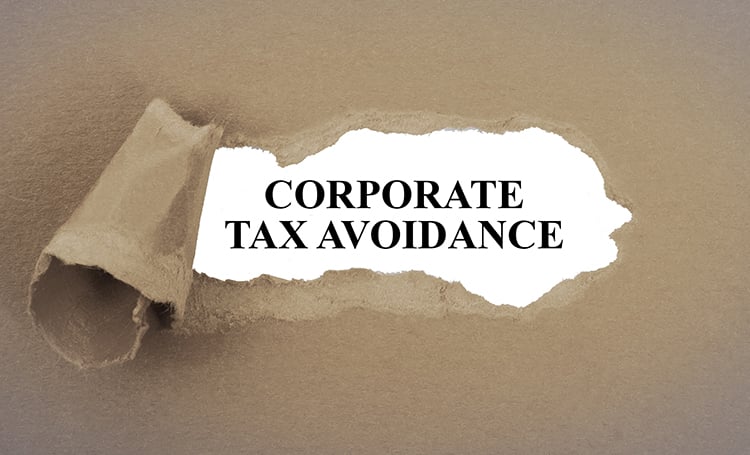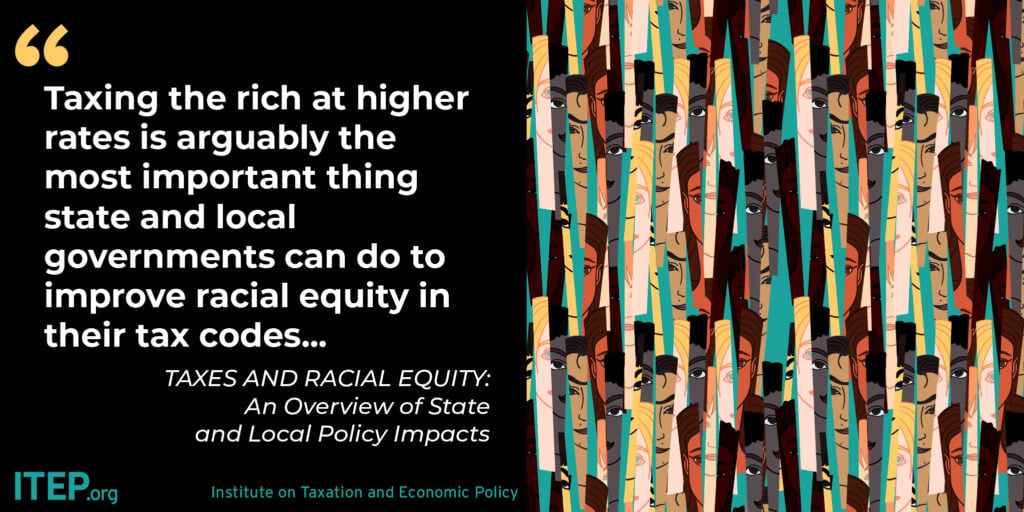
ITEP's Research Priorities
- 2025 tax debate
- Blog
- Cannabis Taxes
- Corporate Taxes
- Corporate Taxes
- Earned Income Tax Credit
- Education Tax Breaks
- Estate Tax
- Federal Policy
- Fines and Fees
- Georgia
- Immigration
- Income & Profits
- Income Taxes
- Inequality and the Economy
- ITEP Work in Action
- Local Income Taxes
- Local Policy
- Local Property Taxes
- Local Refundable Tax Credits
- Local Sales Taxes
- Maps
- Media Quotes
- News Releases
- OBBBA
- Other Revenues
- Personal Income Taxes
- Property & Wealth
- Property Taxes
- Property Taxes
- Publications
- Refundable Tax Credits
- Sales & Excise
- Sales, Gas and Excise Taxes
- Sales, Gas and Excise Taxes
- SALT Deduction
- Select Media Mentions
- Social Media
- Staff
- Staff Quotes
- State Corporate Taxes
- State Policy
- State Reports
- States
- Tax Analyses
- Tax Basics
- Tax Credits for Workers and Families
- Tax Credits for Workers and Families
- Tax Guide
- Tax Principles
- Tax Reform Options and Challenges
- Taxing Wealth and Income from Wealth
- Toolkits
- Trump Tax Policies
- Video
- Webinar
- Who Pays?
Washington Post: Republicans Struggle to Defend Corporate Tax Windfall (Opinion)
April 5, 2021
Corporations are hard-pressed to scream poverty. The Institute on Taxation and Economic Policy found 55 big companies that paid no federal income taxes at all last year: “The tax-avoiding companies represent various industries and collectively enjoyed almost $40.5 billion in U.S. pretax income in 2020, according to their annual financial reports.” Had they actually paid […]
Fiscal Times: Dozens of Major Corporations Paid No Federal Income Taxes in 2020: Report
April 5, 2021
At least 55 large corporations paid no federal corporate income taxes in 2020, according to a new analysis by the Institute on Taxation and Economic Policy. The companies in the analysis had more than $40 billion in pre-tax income and would have paid about $8.5 billion in taxes at the 21% corporate tax rate. But […]
Louisiana Budget Project: Who Pays? Racial Injustice in Louisiana’s Tax System
April 5, 2021
Historic and current injustices – both in public policy and in society more broadly – have resulted in vast disparities in income across race and ethnicity in Louisiana. Unfortunately, our tax system plays an active role in worsening these disparities by asking those with the least to contribute the largest share of their income to […]
MSNBC: Many Corporate Giants (Once Again) Paid No Federal Income Taxes
April 5, 2021
A couple of years ago, the Institute on Taxation and Economic Policy released the results of a detailed study that found of the Fortune 500 companies, about 400 paid an average tax rate of about 11% — roughly half of the current rate of 21% — thanks to a series of loopholes, exemptions, and giveaways […]
Pittsburgh Business Times: Pittsburgh Company among 55 that Paid Zero Corporate Income Tax
April 5, 2021
At least 55 of the biggest and best-known companies in the country didn’t pay federal corporate income taxes during their most recent fiscal year. That includes Pittsburgh’s 11th-largest public company. According to a recently released report by the Institute on Taxation and Economic Policy, the businesses collectively had almost $40.5 billion in U.S. pretax income […]
Washington Post: What Americans Will Get from Biden’s $2 Trillion Infrastructure Plan (Opinion)
April 4, 2021
In addition, a new report from the Institute of Taxation and Economic Policy underscores how well corporations did over the last four years, with 55 big corporations paying no federal corporate income tax. ITEP reports: The tax-avoiding companies represent various industries and collectively enjoyed almost $40.5 billion in U.S. pretax income in 2020, according to […]
The Joint Blog: Report: State and Local Cannabis Tax Revenue Jumps 58%, Surpassing $3 Billion in 2020
April 4, 2021
According to a new report conducted and released by the Institute on Taxation and Economic Policy, tax revenue from state-legal marijuana sales rose significantly in 2020 to surpass $3 billion. “Powered by an expanding legal market and a pandemic-driven boost in cannabis use, excise and sales taxes on cannabis jumped by more than $1 billion […]
Washington Post: Republicans Draw a Blank on Basic Governance (Opinion)
April 4, 2021
But one suspects that Blunt, Wicker and others are protesting this proposed tax increase because of the narrow portion of Americans for whom the 2017 cut did work: the wealthiest. The dividends and stock buybacks benefited rich investors. Meanwhile, according to a new study from the Institute on Taxation and Economic Policy, “At least 55 […]
Financial Times: Biden Faces Clash with Business over Proposed Tax Increases
April 2, 2021
Still, a report by the Institute on Taxation and Economic Policy, a think-tank, on Friday found that at least 55 large and profitable US companies paid no federal corporate income taxes in their most recent fiscal year. Biden administration officials see the tax changes as doing more than simply covering the cost of the plan. […]
Shelton Herald: Houston-based Kinder Morgan among Large Corporations that Didn’t Pay Federal Taxes in 2020
April 2, 2021
Houston-based Kinder Morgan is one of the largest infrastructure companies in North America — and they’re among the at least 55 American corporations that paid absolutely nothing in federal taxes on billions of dollars in profits in 2020. Citing a report from the Institute on Taxation and Economic Policy, Patricia Cohen reported for the New […]
Washington Post: The Daily 202: Biden Infrastructure Push Could Face SALT-y Democratic Challenge
April 2, 2021
A report by the Institute on Taxation and Economic Policy found that companies like Salesforce, Consolidated Edison, FedEx and Nike “were able to avoid paying any federal income tax for the last three years even though they reported a combined income of $77 billion. Many also received millions of dollars in tax rebates.” Read more
Inequality.org: Sales Taxes Widen the Racial Wealth Divide. States and Cities Have Far Better Options.
April 2, 2021
The public discourse over inequality and racial disparities has rightly shifted to how to dismantle structural challenges that create these gross inequities. Addressing racial disparities will require a concerted effort by government across all policy areas. A new report from the Institute on Taxation and Economic Policy (ITEP) offers some perspective on how state and […]
Complex: Nike Hasn’t Paid Any Federal Income Tax for the Last Three Years
April 2, 2021
Nike has made $4.1 billion in profits over the last three years but didn’t pay a dime in federal income tax for its earnings, according to new reports by the New York Times. The publication’s latest findings revealed that the sportswear giant was among the companies that were able to evade federal income tax payments […]
Quartz: Nike And FedEx Haven’t Paid Federal Income Tax in Three Years
April 2, 2021
Despite raking in billions in earnings, Nike, FedEx, and two dozen other public companies have paid no federal corporate income tax in the US since 2018, according to a study by the Institute on Taxation and Economic Policy, a Washington-based research organization. The behavior continues what ITEP describes as a decades-long trend of companies finding […]
Forbes: More Than 50 Major U.S. Corporations—Including Nike And FedEx—Paid No Federal Taxes Last Year
April 2, 2021
Benefitting from Trump-era tax cuts and capitalizing on loopholes in the tax code, at least 55 prominent U.S. companies paid $0 in federal corporate income taxes in 2020 on billions of dollars in profits, according to a report published Friday by the Institute on Taxation and Economic Policy. Read more
Business Insider: Nike, FedEx, and 24 Other Companies with $77 Billion of Combined Income Have Avoided Paying Taxes for Years, a New Report Found
April 2, 2021
55 of America’s biggest companies paid $0 in federal taxes last year, a new study from the Institute on Taxation and Economic Policy (ITEP) found. The 55 publicly traded companies would have paid an estimated $12 billion in federal taxes if not for corporate tax breaks in 2020, including $8.5 billion in tax avoidance and […]
The Hill: 55 Major Companies Paid Zero Federal Income Tax in 2020: Watchdog
April 2, 2021
At least 55 major profitable companies didn’t pay any federal corporate income taxes last year, according a report by the left-leaning Institute on Taxation and Economic Policy (ITEP). The group faulted the GOP tax cuts passed in 2017 as well as tax breaks enacted in the first major coronavirus relief bill passed early last year […]
Associated Press: Even with Pretax Profits, Many Big Companies Pay Zero US Tax
April 2, 2021
Just as President Joe Biden is pushing to raise taxes on companies to help pay for his infrastructure plan, a report from a Washington policy group is highlighting how many firms pay zero despite making big pretax profits. More than 50 of the largest U.S. companies paid nothing in federal income taxes last year, with […]
Fast Company: Report: 55 of America’s Biggest Companies Paid Zero Taxes during the Pandemic
April 2, 2021
The stock market boomed last year, despite a pandemic that put 45 million people out of work. But dozens of the biggest, most profitable corporations in the United States still paid $0 in federal taxes, according to a new report. The nonpartisan Institute on Taxation and Economic Policy found that 55 of the largest firms […]
New York Times: No Federal Taxes for Dozens of Big, Profitable Companies
April 2, 2021
Just as the Biden administration is pushing to raise taxes on corporations, a new study finds that at least 55 of America’s largest paid no taxes last year on billions of dollars in profits. The sweeping tax bill passed in 2017 by a Republican Congress and signed into law by President Donald J. Trump reduced […]
55 Corporations Paid $0 in Federal Taxes on 2020 Profits
April 2, 2021 • By Matthew Gardner, Steve Wamhoff

At least 55 of the largest corporations in America paid no federal corporate income taxes in their most recent fiscal year despite enjoying substantial pretax profits in the United States. This continues a decades-long trend of corporate tax avoidance by the biggest U.S. corporations, and it appears to be the product of long-standing tax breaks preserved or expanded by the 2017 tax law as well as the CARES Act tax breaks enacted in the spring of 2020.

Read as PDF Note: This report is adapted from written testimony submitted by Amy Hanauer before testifying in person to the Senate Budget Committee on March 25, 2021. In 2020, the pandemic killed hundreds of thousands of Americans and unemployment soared to levels not seen since the Bureau of Labor Statistics started collecting data in […]

The corporate tax plan put forth on Wednesday by President Joe Biden to offset the cost of his infrastructure priorities would be the most significant corporate tax reform in a generation if enacted.
West Virginia Center on Budget and Policy: Senate Income Tax Cut Plan is More of the Same: Tax Cuts for the Wealthy, Tax Increases and Budget Cuts for Everyone Else
March 31, 2021
This week, the Senate Finance Committee took up HB 3300, the House’s income tax cut plan, and made significant changes before quickly passing it out of committee. Unlike the House plan, which phased out the income tax over time with no revenue offsets, the Senate’s plan is more similar to the governor’s proposal, making a […]
A New Look at Taxes and Race at the State and Local Levels
March 31, 2021 • By Carl Davis, ITEP Staff, Meg Wiehe

A new ITEP report reveals how different taxes have very different impacts on racial equity and unveils data for two states showcasing the consequences of their contrasting tax policy choices. In short, we find that income taxes can help narrow the racial income and wealth divides while sales taxes generally make those divides worse.
